History professors discuss job readiness of history majors

Dr. Charles Reed
July 16, 2012
Article History has been a common college major for decades. Efforts are underway to make sure students are departing universities well prepared for jobs that require or benefit from applicants who hold history degrees. Dr. Charles Reed, an assistant professor of history at Elizabeth City State University, said he is confident students at the university are well poised for rewarding jobs after graduation. In June, he represented the university at the first national meeting of the American Historical Association’s (AHA) Tuning Project in Arlington, Virginia. He was one of 60 faculty participants invited to a nationwide, faculty-led project to articulate the core of historical study and to identify what a student should understand and be able to do at the completion of a history degree program. This "Tuning" project, supported by a grant from Lumina Foundation (Indianapolis, IN), will test the possibility of harmonizing the nation’s diverse degree programs in a single discipline. Initiated in Europe a decade ago and extended since then to higher education settings in six continents, Tuning has been adapted to the structure of American higher education only in more localized settings. The AHA’s initiative to "tune the history major" encompasses three broad objectives: 1) To articulate the core abilities, habits of mind, and knowledge required of their discipline 2) To develop a clear, common language to express the distinctive value of history for students, employers, and public culture. Students who can see clearly what they are learning, and why, are better equipped to direct their studies towards lifelong learning, meaningful employment, and civic participation 3) To provide a nationwide framework in which historians can design the systems used by their institutions to measure their achievements as teachers. Reed is a historian of modern Britain and the British Empire. His research focuses on notions of identity, citizenship, and belonging in the nineteenth-century British Empire. At ECSU, Reed teaches the World Civilizations sequence, for which he is the coordinator, as well as upper-division courses in European and World History. As a teacher and program assessment coordinator, Charles hopes that the tuning process will help him and his department better serve ECSU’s students. The meeting represents the beginning of a three-year "Tuning" process. During two days of sessions, participants led by the AHA’s Teaching Division and representatives from the Institute for Evidence-Based Change (IEBC) were briefed on the history of tuning in Europe and the developing methodology of the process in the United States. Faculty participants collaborated in small groups to develop a disciplinary core and learning objectives for the discipline of History. After conversing with colleagues there, he returned confident about the level of instruction offered to history majors. "ECSU is well ahead of the curve in our efforts to develop measurable student program and course learning objectives based on national standards," Reed said. "Teaching, learning, and assessment are all processes, however, and having an opportunity to participate in a national conversation about how disciplinary standards are developed is a very exciting prospect for the department." According to Dr. Rebecca Seaman, chair of the ECSU Department of History & Political Science, the "Tuning" process will be an ongoing project. "Dr. Reed and our department are committed to not only looking internally at our departmental and program structures, but to also examine our History Program’s impact and interactions with other areas of the university (such as General Studies and related degreed programs)," Seaman said. "We are also required to collaborate with related disciplinary bodies, such as the Museum of the Albemarle. Our program is already ahead of the curve in that we have already begun the process of establishing a long term partnership with the Museum of the Albemarle, as well as other partnerships and projects with the City of Elizabeth City, the ROTC department at ECSU, and others." Seaman envisions that, as a result of the Tuning process and the support the department and program are receiving internally and externally, students who attend ECSU’s History program will graduate not only with a quality degree, but also with working and internship experience that will make each graduating senior quite successful in a variety of job markets, from museums, libraries, archives, education, research related industries, national parks, and government positions, to name just a few. The Tuning discussion continues online, and the group will reconvene in February 2013 in Washington, D.C.

